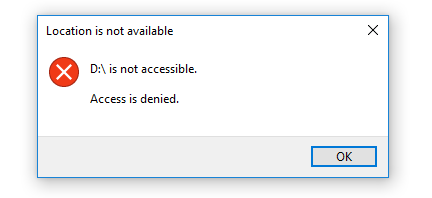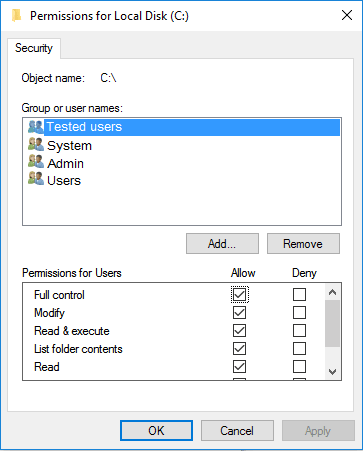[Solved] USB/External Hard Drive Destination Folder Access Denied in Windows 11/10/7
Quick Navigation:
- How to Fix 'External Hard Drive/USB Folder Access Denied' Problem
- Method #1: Change the Drive Ownership to Fix Destination Folder Access Denied
- Method #2: Get Permission to Access to the USB Drive
- Method #3: Format USB/External Hard Drive
- Method #4: Run CHKDSK to fix Destination Folder Access Denied in Windows 11/10/7
The 'USB drive destination folder access denied' error message typically doesn't appear out of nowhere, but rather is often a result of several factors. These may include issues with the USB drive's file system, corrupted files or folders, incorrect permissions settings, malware or viruses, or even hardware problems with the USB drive or the computer's storage system.

- An improper connection to a USB drive or a damaged cable can cause a computer to malfunction or not boot up properly. This can be due to a faulty USB port, a damaged USB cable, or incorrect installation of a USB device.
- Damaged or corrupted file system
- BitLocker encryption of the external hard drive
- Denied permission to use the drive
- The external hard drive is damaged due to a virus
The "destination folder access denied in external hard drive" error message can be caused by several factors. Fortunately, this issue can be fixed using various methods, which will be discussed in this article. By learning these different approaches, you will be able to resolve the problem and access your external hard drive without any issues.
How to Fix 'External Hard Drive/USB Folder Access Denied' Problem
If you're experiencing an issue that's not being resolved, don't worry - there are four effective methods to try. You can attempt each one in turn, moving on to the next if the first doesn't work, until you find the solution that fixes the problem. With these methods, you can be confident that you'll be able to resolve the issue.
Method #1: Change the Drive Ownership to Fix Destination Folder Access Denied
To get permission to access the USB/external drive, first, connect the inaccessible USB drive to the Windows 11/10/7. Then, right-click on the drive in File Explorer and select "Properties." In the Properties window, click on the "Security" tab.
- To access an inaccessible external hard drive, open 'This PC' and right-click on the drive's icon, which will likely be labeled as "inaccessible" or "RAW". This will open a context menu where you can select an option to either "Change drive letter and path" or "Properties".
- Select 'Properties'.
- To access advanced security settings, go to 'Security' and click 'Advanced'. This will open the 'Advanced Security Settings' window.
- Click 'Change permissions' and click 'Edit' in the next window.
- "Check each box under the 'Allow' column and click 'OK' to apply the changes."

If you're using Windows 7, the steps to fix the 'destination folder access denied' issue are slightly different. To resolve this issue, follow the specific steps for Windows 7.
- Right-click on 'inaccessible hard drive' and then click on 'Properties'.
- To access the advanced security settings, go to 'Security', click 'Advanced' and then select 'Edit' from the 'Owner Tab'.
- To change the ownership of a file or folder, click on the username or group under "username or group" to select it, then click on the "change ownership" button. This will allow you to access the previously inaccessible USB drive.
Method #2: Get Permission to Access to the USB Drive
If you encounter an 'USB drive access denied in Windows 11/10' error, it's likely due to insufficient permission to access the disk. To resolve this, check if the destination folder is encrypted, in which case you won't be able to access the drive without formatting it. If not, you can obtain the necessary permission by following the steps.
- Go to 'This PC' or 'My Computer'.
- Select and right-click the 'inaccessible drive'.
- Left-To change the security settings, click on 'Properties', then 'Security', and finally 'Change' from the list provided.
- A new window titled 'Permissions for a new volume (E:) will popup. Click the 'Add' tab and add a new user.
- Click 'Ok' and then navigate to the Permission part and check the box in the 'Full Control' tab. Click 'Ok' when you are done.
If you're unable to save changes or check 'Full Control' on a Windows 10 external hard drive, try restarting your computer and check if the drive is still available. If the issue persists, move on to the next method.
Method #3: Format USB/External Hard Drive
Formatting the external hard drive can resolve the 'USB destination folder access denied' issue, but it will delete all data on the drive. To protect your data, recover it first using a software like Deep Data Recovery, and then format the drive.
Deep Data Recovery is a reliable and 100% effective tool designed to recover files from various storage media, including RAW drives, external hard drives, USB drives, and hard disk/partitions. It works by scanning and recovering lost files, offering a comprehensive file recovery solution to help users get back lost data.
How to Recover Trapped Data in External Hard Drive
Here are the simple steps to recover trapped data from an external hard drive using Deep Data Recovery Software: Deep Data Recovery Software can scan the external hard drive and recover trapped data, including files, folders, and other data types, even if the drive is damaged or corrupted. The software can also recover data from formatted or deleted partitions, and even from drives that have been physically damaged.
- Download and run the best USB drive recovery tool
- Select the location where you want to scan the trapped files, which is the USB/External drive, and click 'Scan' to start the external hard drive recovery process.
- After scanning, the result window will appear. Select the files you want to recover and click 'Recover' to save them on your computer.


After completing the recovery process, the final step is to format the external hard drive. To do this, follow the steps below: (insert steps here).
How to Format External Hard Drive to Fix 'Destination Folder Access Denied'
- Right-click 'Start' to open Disk Management and select 'Disk Management'.
- Right-To format the inaccessible disk, click on it and select the 'Format' option. Then, choose the 'NTFS' file system and click 'OK' to confirm the formatting process.
- After running the command, you should restart your computer to complete the formatting process and restore the external hard drive's functionality. This will ensure that the drive is properly formatted and ready for use.
Method #4: Run CHKDSK to fix Destination Folder Access Denied in Windows 11/10/7
If the three methods above do not work, try to fix the file system with CHKDSK, which is suitable for a 'USB drive access denied' error code. Follow these easy steps:
- Right-To resolve the 'destination folder access denied external hard drive' error, click on the hard drive partition that's causing the issue and select 'Properties'.
- To run the CHKDSK process, select 'Tools' and then 'Check Now' from the Windows Disk Cleanup window. Alternatively, you can also run it from the command prompt.
- If your external hard drive is not showing up on your PC, try restarting your computer and see if it appears after the restart. This is often a simple solution to the problem. If it still doesn't work, there might be other issues at play, such as a faulty drive or a problem with the USB port.
If you're experiencing the 'flash drive access denied' error code, don't worry - we've got you covered. We've identified four potential solutions to resolve this issue, and one of them should work for you. Just remember to take precautions to prevent any accidental data loss. By trying out these methods, you should be able to access your flash drive again and get back to your important files.
Related Articles
- How to Fix USB Drives not showing up in Windows 10
- Fix DCIM Folder Empty, Not Showing All Photos
- How to Fix a Windows 11 Installation Error 0x8007007f
- [Solved] Recycle Bin Not Showing Deleted Items